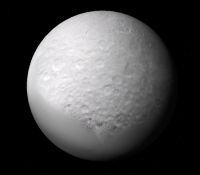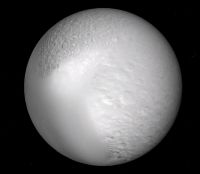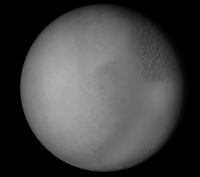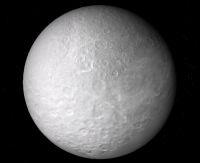Difference between revisions of "Rhea"
Jump to navigation
Jump to search
(Added image.) |
(Added content.) |
||
| (One intermediate revision by the same user not shown) | |||
| Line 14: | Line 14: | ||
!bgcolor="lightsteelblue" colspan="2"|Planetary mean orbits | !bgcolor="lightsteelblue" colspan="2"|Planetary mean orbits | ||
|- | |- | ||
| − | |width="30%"|Epoch||align="right" width="50%"| | + | |width="30%"|Epoch||align="right" width="50%"|2005.41409993155 |
|- | |- | ||
| − | |width="30%"|Semimajor axis (a)||align="right" width="50%"| | + | |width="30%"|Semimajor axis (a)||align="right" width="50%"|527225476.502164 m |
|- | |- | ||
| − | |width="30%"|Eccentricity (e)||align="right" width="30%"|0. | + | |width="30%"|Eccentricity (e)||align="right" width="30%"|0.000909561682184622 |
|- | |- | ||
| − | |width="30%"|Inclination (i)||align="right" width="30%"| | + | |width="30%"|Inclination (i)||align="right" width="30%"|27.94971857° <br> (0.487814614025395 radian) |
|- | |- | ||
| − | |width="30%"|Longitude of the ascending node (LAN, ☊)||align="right" width="30%"| | + | |width="30%"|Longitude of the ascending node (LAN, ☊)||align="right" width="30%"|168.8079837° <br> (2.94625511954542 radian) |
|- | |- | ||
| − | |width="30%"|Longitude of periapsis (ϖ)||align="right" width="30%"| | + | |width="30%"|Longitude of periapsis (ϖ)||align="right" width="30%"|360.9692475° <br> (6.30010186733614 radian) |
|- | |- | ||
| − | |width="30%"|Mean longitude (L)||align="right" width="30%"| | + | |width="30%"|Mean longitude (L)||align="right" width="30%"|448.7342263° <br> (7.83188971564837 radian) |
|- | |- | ||
!bgcolor="lightsteelblue" colspan="2"|Selected physical parameters | !bgcolor="lightsteelblue" colspan="2"|Selected physical parameters | ||
| Line 44: | Line 44: | ||
|width="30%"|LAN||align="right" width="30%"|6.09808 | |width="30%"|LAN||align="right" width="30%"|6.09808 | ||
|- | |- | ||
| − | |width="30%"|Note||align="right" width="30%"|*Elements given are from Rhea.cfg ( | + | |width="30%"|Note||align="right" width="30%"|*Elements given are from Rhea.cfg (Orbiter 2005P1) |
|} | |} | ||
| Line 57: | Line 57: | ||
|- | |- | ||
!Add-on!!Source!!Version!!Author!!Type!!Release Date!!Compatibility!!Wiki article | !Add-on!!Source!!Version!!Author!!Type!!Release Date!!Compatibility!!Wiki article | ||
| + | |- | ||
| + | |[https://www.orbiter-forum.com/resources/2005-with-p1-patch-files.5432/ 2005 (with P1 patch files)]||O-F Resources||050216||martins||Orbiter Download||16 February 2005||Orbiter 2005|| | ||
|- | |- | ||
|[https://www.orbiter-forum.com/resources/orbiter-2003-p2.5433/ Orbiter 2003-P2]||O-F Resources||031217||martins||Orbiter Download||17 December 2003||Orbiter 2003-P2|| | |[https://www.orbiter-forum.com/resources/orbiter-2003-p2.5433/ Orbiter 2003-P2]||O-F Resources||031217||martins||Orbiter Download||17 December 2003||Orbiter 2003-P2|| | ||
| Line 75: | Line 77: | ||
Rhea-orbiter2002p3.jpg|<center>Rhea in Orbiter 2002P3</center> | Rhea-orbiter2002p3.jpg|<center>Rhea in Orbiter 2002P3</center> | ||
Rhea-Orbiter2003P2.jpg|<center>Rhea in Orbiter 2003P2</center> | Rhea-Orbiter2003P2.jpg|<center>Rhea in Orbiter 2003P2</center> | ||
| + | Rhea-Orbiter2005P1.jpg|<center>Rhea in Orbiter 2005P1</center> | ||
PIA07763 Rhea full globe5.jpg|<center>Rhea as seen by the [[w:Cassini–Huygens|Cassini]] spacecraft on 26 November 2005<br>From Wikimedia Commons</center> | PIA07763 Rhea full globe5.jpg|<center>Rhea as seen by the [[w:Cassini–Huygens|Cassini]] spacecraft on 26 November 2005<br>From Wikimedia Commons</center> | ||
</gallery> | </gallery> | ||
| Line 84: | Line 87: | ||
[[Category: Articles]] | [[Category: Articles]] | ||
[[Category: Celestial bodies]] | [[Category: Celestial bodies]] | ||
| + | [[Category:Solar System]] | ||
[[Category: Natural satellites]] | [[Category: Natural satellites]] | ||
[[Category:Satellites of Saturn]] | [[Category:Satellites of Saturn]] | ||
Revision as of 02:22, 17 September 2024
| Rhea | |
|---|---|
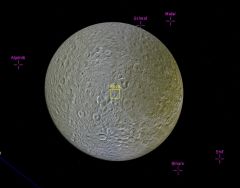
| |
| Rhea in Orbiter 2016 with D3D9 client | |
| Designation | |
| Name | Rhea |
| Reference body | Saturn |
| Planetary mean orbits | |
| Epoch | 2005.41409993155 |
| Semimajor axis (a) | 527225476.502164 m |
| Eccentricity (e) | 0.000909561682184622 |
| Inclination (i) | 27.94971857° (0.487814614025395 radian) |
| Longitude of the ascending node (LAN, ☊) | 168.8079837° (2.94625511954542 radian) |
| Longitude of periapsis (ϖ) | 360.9692475° (6.30010186733614 radian) |
| Mean longitude (L) | 448.7342263° (7.83188971564837 radian) |
| Selected physical parameters | |
| Mean radius | 764000 km |
| Mass | 2.49×1021 kg |
| Rotation elements | |
| SidRotPeriod | 390411 seconds (108.4475 hours or 4.5 days) |
| SidRotOffset | 0 |
| Obliqutiy | 0.4895 |
| LAN | 6.09808 |
| Note | *Elements given are from Rhea.cfg (Orbiter 2005P1) |
Rhea is the ninth-largest moon in the Solar System and the second-largest moon of Saturn. Rhea was discovered by Giovanni Domenico Cassini on 23 December 1672 about the same time he discovered Dione, Iapetus, and Tethys, but the name Rhea referred to by John Herschel stuck.
Rhea in Orbiter
Rhea was first introduced in Orbiter with the release of Orbiter 2002 in April 2002.
| <center?Orbiter versions and add-ons which include Rhea | |||||||
| Add-on | Source | Version | Author | Type | Release Date | Compatibility | Wiki article |
|---|---|---|---|---|---|---|---|
| 2005 (with P1 patch files) | O-F Resources | 050216 | martins | Orbiter Download | 16 February 2005 | Orbiter 2005 | |
| Orbiter 2003-P2 | O-F Resources | 031217 | martins | Orbiter Download | 17 December 2003 | Orbiter 2003-P2 | |
| Orbiter 2003-P1 | O-F Resources | 031105 | martins | Orbiter Download | 5 November 2003 | ||
| Moons of Saturn Part 3 | AVSIM | Rolf Keibel | Scenery | 19 October 2002 | |||
| Orbiter 2002 | O-F Resources | 020419 | martins | Orbiter Download | 19 April 2002 | Orbiter 2002 | |
See also
Gallery
Rhea as seen by the Cassini spacecraft on 26 November 2005
From Wikimedia Commons
| edit The Solar System | |
|---|---|
| Central star |
Sun (Sol) |
| Planets |
Mercury - Venus - Earth - Mars - Jupiter - Saturn - Uranus - Neptune |
| Natural satellites |
Moon - Phobos - Deimos - Io - Europa - Ganymede - Titan - more... |
| Add-ons |
Planets - Dwarf Planets - Small objects - Natural satellites - Alternative star systems |
 | This natural satellite related article is a stub. You can help Orbiterwiki by expanding it. |
